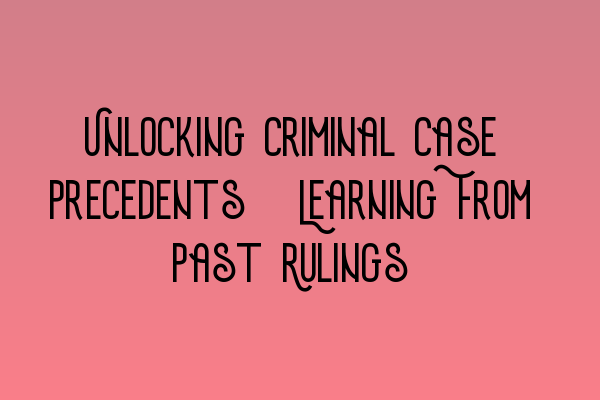Unlocking Criminal Case Precedents: Learning From Past Rulings
As a criminal law practitioner, it is crucial to stay abreast of the latest legal developments and case precedents. Understanding past rulings and their implications can significantly enhance your advocacy skills and provide you with a solid foundation for handling your clients’ cases effectively. In this article, we will explore the importance of unlocking criminal case precedents and how they can shape your legal practice.
The Significance of Case Precedents
Case precedents serve as binding or persuasive authorities that guide the resolution of similar legal issues. They are established through the judiciary’s interpretation and application of statutes, regulations, and constitutional provisions. These precedents provide a consistent and predictable framework for legal decision-making, ensuring fairness and justice in the criminal justice system.
By studying and analyzing case precedents, you gain insight into the principles and reasoning behind landmark rulings. This knowledge enables you to develop persuasive arguments and anticipate potential counterarguments from the opposing side. It also helps you understand the nuanced approaches different courts may take when interpreting similar legal provisions.
Learning From Past Rulings
When examining past criminal case precedents, there are several key aspects to consider:
- Facts: Understand the factual background of the cases in question. Analyzing the similarities and differences between your client’s case and the precedent can help you strategize and tailor your legal arguments accordingly.
- Legal issues: Identify the specific legal issues that were addressed in the precedent-setting case. This will enable you to link relevant legal principles to your client’s case.
- Rationale: Scrutinize the court’s reasoning and rationale for arriving at its decision. This analysis will help you evaluate the credibility and applicability of the precedent to your client’s case.
- Binding or persuasive: Determine whether the precedent is binding or persuasive in your jurisdiction. This distinction affects how much weight the precedent holds in influencing the courts’ decisions.
By following this systematic approach, you can harness the power of past rulings to build a compelling case for your client. Skillful implementation of case precedents demonstrates your legal expertise and establishes credibility in the courtroom.
Utilizing Technology to Unlock Precedents
In the digital age, accessing and analyzing criminal case precedents has become more convenient and efficient. Online legal research databases provide comprehensive collections of judgments, enabling you to search for specific cases, keywords, or legal principles. These resources save you invaluable time and effort, allowing you to focus on crafting strong legal arguments.
Learning from past rulings is not limited to the academic realm. The Solicitors Qualifying Examination (SQE) offers aspiring criminal law practitioners the opportunity to develop their understanding of case precedents. SQE preparation courses, such as the ones offered by SQE Criminal Law & Practice Law UK, incorporate comprehensive modules on legal research and analysis. They equip candidates with the necessary skills to effectively unlock criminal case precedents and apply them to real-world scenarios.
Continuing Legal Education
As a criminal law practitioner, your learning journey does not end upon qualification. Ongoing professional development is essential for staying at the forefront of your field. Participating in continuing legal education programs, attending seminars, and engaging in discussions with peers allow you to deepen your knowledge and refine your skills.
If you are preparing for the SQE, it is crucial to practice applying case precedents to multiple-choice questions and mock exams. Resources such as the SQE 1 Practice Exam Questions and SQE 1 Practice Mocks FLK1 FLK2 articles are invaluable tools for evaluating your progress and familiarizing yourself with the exam format.
Stay informed about upcoming SQE exam dates to plan your preparation effectively. The SRA SQE Exam Dates article provides you with a comprehensive overview of the examination schedule, ensuring you have ample time to incorporate case precedents into your study plan.
Conclusion
Unlocking criminal case precedents is an indispensable skill for criminal law practitioners. By leveraging the power of past rulings, you strengthen your legal arguments, anticipate potential challenges, and achieve favorable outcomes for your clients. Embrace the opportunities offered by technology and comprehensive SQE preparation courses to enhance your understanding of case precedents and excel in your legal practice.
About SQE Criminal Law & Practice Law UK: SQE Criminal Law & Practice Law UK is a leading provider of SQE preparation courses. We offer comprehensive modules and resources designed to equip aspiring criminal law practitioners with the knowledge and skills needed to succeed in the SQE examinations.
